 image: Brandy Martell, 400 block of 13th St near Frankland St, Oakland
image: Brandy Martell, 400 block of 13th St near Frankland St, Oakland
 image: Brandy Martell, 400 block of 13th St near Frankland St, Oakland image: Brandy Martell, 400 block of 13th St near Frankland St, Oakland ‘Tell all the truth', wrote the poet Emily Dickenson, 'but tell it slant’. For ‘The Truth must dazzle gradually/Or every one be blind.’[1] That is pretty much Mark’s Gospel’s account of resurrection, isn’t it? Whilst other resurrection stories were attached later, the two earliest, and arguably the best, manuscripts of Mark’s Gospel stop abruptly at verse 8 of chapter 16, with women fleeing from an empty tomb and ‘saying nothing to anyone, for they were afraid.’ Furthermore, the text simply stops in mid-sentence, with the little preposition which means ‘for’. Mark’s Gospel, at least, is clear that resurrection is both truly astounding and impossible to convey straightforwardly. For how do we describe resurrection? How do we communicate resurrection? How do we live resurrection? The nature of resurrection is that it involves strange truths of transformation: which require, like so much great art, ‘telling it slant’; which rest on mystery; and which revolve around deep, lived, experience. For art, mystery, and experience: these three things are at the heart of the strange truths of resurrection we exult in today, as witnessed to by our readings and key images this morning, and the continuing life of you and I, and all who follow Christ…
2 Comments
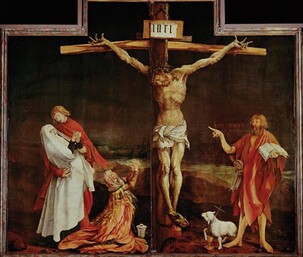 What kind of a crucifixion do we share in on this Good Friday? Is the cross a threat, a judgement, or even a weapon? Is it simply a site and symbol of death and destruction? Or is it a pathway of transformation, for us and for our world? To help us enter it as a pathway of loving transformation, I want to offer a few words around four different images of crucifixion, which may support us in our spiritual journeying today. Each is an image from the suffering of the last century of our modern world. Each, in different ways, represents the crucifixion afresh, and encourages us to know transformation. Let me first however, in introduction, share this great image of the crucifixion from Matthias Grünewald, painted for the Isenheim Altarpiece in the hospital chapel of St Anthony’s monastery. What do you see in it?... 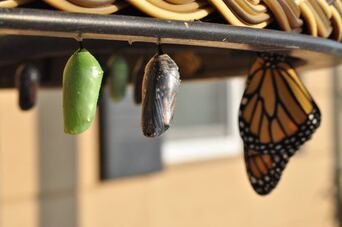 image: by Suzanne D.Williams on Unsplash image: by Suzanne D.Williams on Unsplash As a pioneer female priest, one of my wife’s achievements was becoming the first female Rector of the parish of Stanhope, sometimes known as ‘the Queen of Weardale’, high up on the roof of England. She added to a line going back to the year 1200, including some famous names in church history. For whilst, financially and in other ways, ministry in remoter rural areas is challenging today, centuries ago Stanhope was known as the richest living in the north of England for clergy. This was because, way back then, the Church of England drew tithes from local people, who, in the Durham Dales, were chiefly miners and poor farmers and agricultural workers. Not for nothing was this then a significant contributor to the Dales, and County Durham as a whole, becoming strongly Methodist. There is a wonderful little story however about one of my wife’s distinguished predecessors, Joseph Butler. Butler not only became Bishop of Bristol and then of Durham, but, alongside helping to develop 18th century economic theory, he is best known as one of the leading theologians of the day: so much so that the Church of England commemorates him each year on 16 June. Now Butler had been head chaplain to King George II’s wife, Caroline. Some while after he had moved to Stanhope, the Queen therefore asked around the royal court. ‘does anyone know what has happened to Butler? Is he dead?’ ‘No, ma’am’, came back the reply by one in the know, ‘he is not dead, only buried’. ‘Not dead, only buried’: what a wonderful phrase, and one resonating both with our Gospel reading (John 12.20-31), and with our reflections on Celtic Christianity this morning… 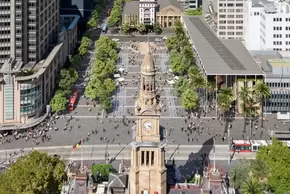 a possible future Sydney Town Hall square: artist's impression for City of Sydney a possible future Sydney Town Hall square: artist's impression for City of Sydney ‘People assume’, said the tenth Dr Who,[1] ‘that time is a strict progression of cause to effect, but *actually* from a non-linear, non-subjective viewpoint - it's more like a big ball of wibbly wobbly... time-y wimey... stuff.’ Isn’t that Time Lord right? Time is much more fascinating than we ordinarily think. In today’s Gospel reading we are in this respect challenged deeply. For we are called to choose not only to address what is valuable in past, present and future: in what we call chronological, or measurable, time, deriving from the Greek word ‘chronos’. Rather we are brought face to face with ‘kairos’, another Greek word which means the ‘right or critical’, or meaningful, time. Πεπλήρωται ὁ καιρὸς, are the key words in Greek in Mark chapter 1 verse 15: words often translated as ‘the time has been fulfilled’ (or ‘is ripe’ - for, as the verse continues, ‘the reign of God has drawn near, (repent) turn around and believe the good news’…  image by Josh Eckstein on Unsplash image by Josh Eckstein on Unsplash Some of you may have noticed a change to our worship space today. The baby has gone – transformed it seems into a scallop shell. I am passing it around among you as I speak and I invite you to hold it for a few moments if you wish... ...Now, what strange alchemy is this, you may ask? What does this signify? We’ll come back to that. For now, just be aware that we are being subtly, and not so subtly, redirected, from the outer to the inner; from the seen to the unseen; from creation to re-creation; from the incarnation to the resurrection. This is a theological progression that demands that we go back to the beginning – to the creation of light in the story of Genesis as we heard, and to the beginning of the gospel as the author of Mark proclaims it just a couple of verses earlier than today’s text, ‘the beginning of the good news of Jesus Christ, the Son of God’... 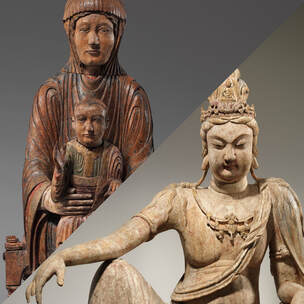 Enthroned Virgin and Child (1150-1200 France) & Bodhisattva Avalokiteshvara in Water Moon Form/Shuivue Guanyin (907-1125 Liao dynasty) from the Metropolitan Museum of Art, New York Enthroned Virgin and Child (1150-1200 France) & Bodhisattva Avalokiteshvara in Water Moon Form/Shuivue Guanyin (907-1125 Liao dynasty) from the Metropolitan Museum of Art, New York Wake up! Keep awake! These are familiar injunctions in Advent. What however do they mean to us today? What are we to wake up to? And for what is it that we are to keep awake? At the heart of the Advent and Christmas mysteries, is a call to transformation: an invitation to awaken, to recognise what is really going on in ourselves and in the wider world; an invitation to respond, to wake up, to the divine possibilities latent, or birthing, within us. Whether it be through stories and images of wonder and imagination, as in the Christmas angels and the Magi, or in today’s Gospel challenge to see beneath the changes and chances of our immediate existence, we are invited into transformation: the ever-transforming power of divine love and awakening… 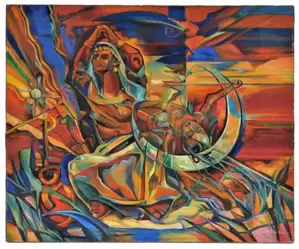 image: Hagar and Ishmael by John Stayn image: Hagar and Ishmael by John Stayn As I have lived most of my church life primarily in Anglican and ecumenical settings, I have to admit to some bemusement about the annual marking of the Uniting Church’s founding. I guess it is partly the equivalent of the patronal festivals in other mainstream Churches. However these typically centre on a particular saint, or an aspect of faith (such as the Holy Trinity), after which a particular congregation is named, not a particular Christian denomination. Denominationalism is, after all, a modern idea, and would be a horror to our Uniting Church Reformation forebears. Jean Calvin, for example, sought to reform the one universal Church of God, not to create an alternative. The great Methodist pioneer John Wesley also formed a vital and innovative new movement but never sought to leave the Church of England. That is pertinent in marking this anniversary. For it directs us back to the Uniting Church’s crucial ecumenical and ‘open future’ charisms. These are clear in The Basis of Union, the key Uniting Church founding document. As a body, we are only one very small part of the universal Church through time and space. Therefore, rather than being yet one more denomination, we are called to help pioneer new paths of faith and relationships. Our calling is always to be a Uniting Church, holding our structures lightly and open to new ways of being followers of Jesus with others. So how what might today’s story about Hagar say to us in that? For it is certainly a powerful challenge... Today’s Gospel reading is a very rich passage, full of extraordinary metaphors, story and meaning. It includes, for example, that powerful central affirmation of Christian Faith that God so loved the world that they sent their Beloved One that all who believe may have eternal life. Note well the heart of this good news: that God loves the world so much that all who believe – not just the doctrinally righteous, or the ethically conservative, but all may have eternal life. For the God we celebrate today is the God of unlimited, inexhaustible, love. As our Gospel text says, Christ comes among us not for condemnation, but for love and salvation. Let us therefore affirm again that you, we, all of us, are loved. The Gospel, our Good News, invites us to claim this, and live it. All of which brings us, in this passage, to the person of Nicodemus, and to light, and darkness…  photo: Rachel Cook on Unsplash photo: Rachel Cook on Unsplash Do you identify with the conversion of Saul, later re-named Paul, which we hear read today? It does not fit us all. Yet it is certainly a striking story, which has powerfully influenced some, especially evangelical, Christian traditions. Indeed, it has sometimes become a classic model for becoming a Christian. It speaks, for example, of a remarkable repentance – or turning around, which is really what repentance means. It speaks of whole-hearted, whole-self transformation of life in Christ; and, above all, it speaks of the transforming power of God’s love and grace. All of this, we may say, are indeed important aspects of Christian Faith, and, as such, the story challenges us, like Saul/Paul, to consider the direction in which we are traveling and what is drawing us and companioning us on the way. All of these things also go to the heart of the sacrament of baptism which we were planning to share this morning. Unfortunately this has had to be postponed due to the baptismal candidate having contracted COVID-19. Nonetheless, it is still worth us reflecting today on the sacraments of baptism and of communion, which we do share together this morning. For, like Saul’s conversion, what do we make of them? How does God’s grace work through them, and in particular moments of our lives?… How do we picture transfiguration? Do you like the transfiguration mandala of Jack Haas for example? It is better than many as a prompt for reflection today. For the story, symbol, and spirituality of Christian transfiguration is rich and profound. Yet it can be a puzzle and portrayed in very limited dimensions, and can then seem quite distant to some of us. Let me therefore offer four pathways into the reality and meaning of Christ’s Transfiguration: four pathways on the model of the spirituality wheel of which Penny Jones spoke to us a few months ago, and to our Ministers Retreat this week. For transfiguration, as Jack Haas suggests, is like a biblical mandala, of enriching colour and creativity for our lives: a kaleidoscope revealing divine transforming love…
|
Authors
sermons and reflections from Penny Jones & Josephine Inkpin, a same gender married Anglican clergy couple serving with the Uniting Church in Sydney Archives
June 2024
Categories
All
|
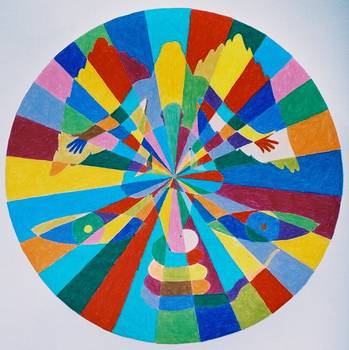
 RSS Feed
RSS Feed